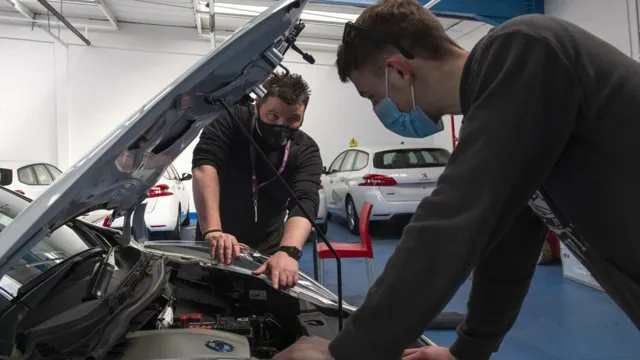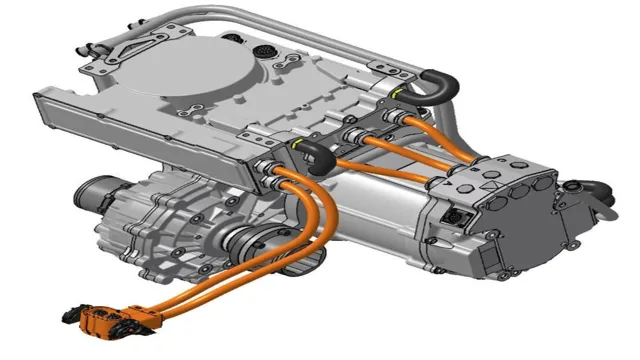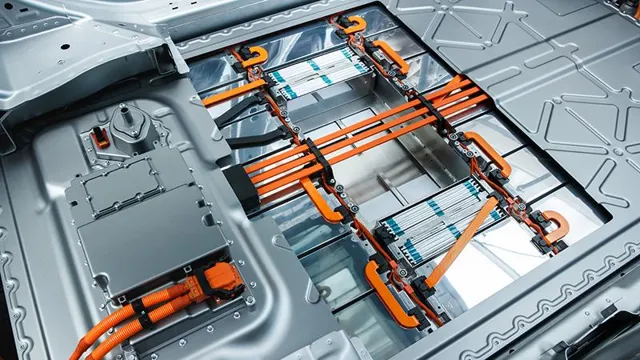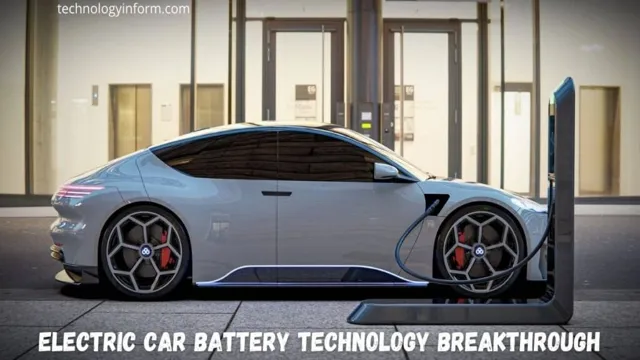Rev Up Your Career with Electric Car Technology Training: Empowering The Automotive Industry
Electric cars are becoming increasingly popular these days, and it’s not hard to see why. With gas prices constantly on the rise and concerns about the environment becoming more pressing than ever, electric cars offer drivers a cheaper, more eco-friendly way to get around. The only problem is that many people aren’t sure where to start when it comes to electric car tech training.
With all of the new terminology and technology involved, it can be overwhelming to get started. But don’t worry, we’ve got you covered. In this blog post, we’ll go over the basics of electric car tech training so that you can feel confident getting behind the wheel of an electric car.
We’ll cover everything from the different types of electric car batteries to the charging process, so that you can understand how electric cars work and how to maintain them. Electric car tech training is important not only for personal use, but also for anyone considering a career in the automotive industry. As more and more electric cars are hitting the market, demand for technicians and mechanics who are well-versed in electric car technology is skyrocketing.
By learning the basics of electric car tech, you can position yourself as a valuable asset in the job market and open up new career opportunities. So if you’re curious about electric cars and want to learn more, or if you’re looking to expand your skill set as an automotive technician, keep reading. We’ll break down the basics of electric car tech training in an easy-to-understand way, so that you can start driving and working on electric cars with confidence.
Why Electric Cars?
If you’re considering a career in the automotive industry, then electric car technology training should be on your radar. Electric cars are gaining popularity, and as we move towards a greener future, the demand for electric vehicles is only going to increase. With little to no emissions, electric cars are better for the environment and will help to improve air quality.
The technology used in electric cars is also constantly evolving, meaning there will be a high demand for trained professionals who can maintain and repair these vehicles. By completing an electric car technology training program, you’ll be able to differentiate yourself in the job market and gain the skills necessary to succeed in this exciting field.
Advantages of Electric Cars
Electric cars are becoming increasingly popular due to their many advantages over traditional vehicles. First and foremost, electric cars are much more environmentally friendly than gas-powered cars. This is because they emit no harmful pollutants during operation, which means that they significantly reduce air pollution and greenhouse gas emissions.
Moreover, electric cars are relatively inexpensive to operate and maintain since they have fewer moving parts than traditional vehicles. This translates to lower maintenance and repair costs and ultimately leads to savings for the owner. Another advantage of electric cars is their quiet operation, which makes for a more peaceful driving experience.
Additionally, electric cars have quicker acceleration and smoother and more responsive handling compared to their gasoline counterparts. In conclusion, electric cars are a sensible and sustainable choice for anyone looking for a better driving experience, lower running costs, and a cleaner, healthier environment.

Types of Electric Cars
“Why Electric Cars?” Electric cars have become increasingly popular over recent years due to their numerous advantages over traditional gas-powered vehicles. For starters, electric cars are environmentally friendly, emitting no harmful pollutants and reducing our carbon footprint. This means cleaner air, lower greenhouse gas emissions, and healthier living conditions for people and wildlife alike.
Additionally, electric cars are cheaper to operate, with fuel costs coming in at a fraction of traditional vehicles. They are also more efficient, with advanced battery and motor technology that provides instant torque and acceleration. While there are different types of electric cars, from all-electric to plug-in hybrids, they all share these benefits and offer a sustainable solution for the future of transportation.
As we continue to prioritize a cleaner, more sustainable environment, electric cars will play a crucial role in reducing our reliance on fossil fuels and paving the way for a better tomorrow.
How Do Electric Cars Work?
If you’re interested in electric car technology training, then you might be wondering how these cars work. Simply put, electric cars are powered by an electric motor instead of a gas engine. They get their power from a battery, which can be charged using electricity from a charging station or a wall socket.
The battery then sends power to the electric motor, which drives the wheels. Unlike gas cars, which emit harmful pollutants into the air, electric cars produce zero emissions. Plus, they’re much quieter than gas cars and require less maintenance since they have fewer moving parts.
Of course, like all technology, there are pros and cons to electric cars. While they’re more environmentally friendly and cheaper to operate over time, they’re typically more expensive to purchase upfront and may not have the same range as gas cars. However, with advancements in battery technology and charging infrastructure, electric cars are becoming a more viable option for drivers looking to reduce their carbon footprint and save money on fuel costs.
With a bit of electric car technology training, you can learn all about the inner workings of these fascinating vehicles and help shape the future of transportation.
Electric Motors and Batteries
Electric cars work by using an electric motor powered by batteries instead of a gasoline-powered engine. The motor, which is connected to the vehicle’s wheels, powers the car forward and provides an excellent driving experience. The batteries in an electric car are responsible for storing and delivering electricity to the motor.
These batteries have a limited range of travel, and the maximum distance they can cover on a single charge varies from car to car. Therefore, it is crucial for electric car drivers to plan their trips carefully and recharge the batteries when they are running low. Although electric cars may seem intimidating at first, they are straightforward to use, and the benefits of using them far outweigh those of traditional gasoline-powered vehicles.
Electric motors and batteries are the heart and soul of electric cars, and they offer cleaner, quieter, and more efficient modes of transportation. By eliminating the need for gasoline and oil, electric cars help reduce harmful emissions that contribute to climate change, and they are an excellent alternative to traditional vehicles.
Charging and Range
Electric cars have come a long way in recent years, and they continue to grow in popularity. However, many people still wonder how they work and what makes them different from traditional gas-powered vehicles. In terms of charging and range, electric cars rely on large batteries that store energy from the power grid.
Depending on the car’s make and model, the battery may take anywhere from a few hours to several days to fully charge. When it comes to range, some electric cars have a limited distance they can travel before needing a recharge. Fortunately, advancements in battery technology have increased the distance an electric car can travel on a single charge.
Overall, while charging times and range can still be a concern for some drivers, electric cars continue to thrive as a cleaner and more sustainable form of transportation.
Maintenance
Electric cars are becoming increasingly popular as people are becoming more environmentally conscious. But how do electric cars work? Unlike traditional cars, electric cars use an electric motor to power the vehicle instead of a gasoline engine. This motor is powered by a battery pack that is rechargeable, meaning that you need to plug in your car to an electric power source in order to charge it.
The battery pack stores energy that is used to power the electric motor and can last anywhere from a few hours to several days, depending on the model and usage of the car. Electric cars also have regenerative braking, which allows the car to recover energy when the brakes are applied. This energy is then stored in the battery pack, making the car even more energy efficient.
Overall, electric cars are a great way to reduce greenhouse gas emissions and lower your carbon footprint, while still being a reliable and efficient mode of transportation.
Electric Car Technology Training Programs
If you’re interested in electric car technology training, there are plenty of options available today. As demand for electric vehicles continues to grow, more and more professionals are needed to design, manufacture, sell, and service EVs. From college degree programs to technical training workshops, there are many opportunities to gain the skills and knowledge needed for success in this field.
These programs may cover topics such as electric motor systems, battery technology, charging infrastructure, power electronics, and more. By enrolling in an electric car technology training program, you can position yourself for a rewarding and exciting career in this fast-growing industry. Whether you’re a recent high school graduate or a seasoned professional looking to switch careers, there’s never been a better time to explore your options in electric car technology.
Online Training and Courses
Electric Car Technology Training Programs are becoming increasingly popular in response to the growing demand for electric vehicles. Online training and courses are now available to educate and prepare individuals for a career in electric car technology. These programs cover a range of topics, including battery technology, electric drive systems, and charging infrastructure.
Upon completion of the training, individuals can pursue jobs in a variety of fields, including automotive engineering, manufacturing, and repair. With the rise of electric vehicles and the need for skilled professionals in this rapidly developing industry, Electric Car Technology Training Programs offer a promising career path for those looking to enter the field. So, if you want to succeed in this field, consider enrolling in these training programs and stay ahead of the curve.
In-person Training and Workshops
If you’re interested in learning more about electric car technology, then participating in an in-person training or workshop might be the perfect opportunity for you. These programs provide hands-on experience and expert guidance on the latest advancements in electric vehicle (EV) technology. You’ll learn about topics such as battery technology, charging infrastructure, and the most innovative features of current/forthcoming electric cars.
Whether you’re a technician, engineer, or simply a curious consumer, there are training programs available to meet your needs. By participating in these programs, you’ll gain a deeper understanding of electric car technology and be better equipped to utilize the latest industry innovations. So, start exploring the electric vehicle training programs available and take the first step towards EV empowerment!
Future of Electric Cars
Electric car technology training is becoming increasingly important in the future of electric cars. As more and more people switch to electric vehicles, there will be a growing need for professionals who are knowledgeable about electric car technology. This includes not only engineers, but also mechanics, technicians, and electricians.
Training in electric car technology will cover a wide range of topics, including battery technology, charging infrastructure, and software development. As electric cars become more advanced, this training will become even more crucial in order to keep up with the latest technology and provide high-quality service to electric vehicle owners. Those who invest in electric car technology training will have a key role to play in shaping the future of transportation, and will be in high demand in the years to come.
Conclusion
In conclusion, electric car technology training is the key to unlocking the potential of sustainable transportation. Learning how to design, build, and maintain electric vehicles is not only an investment in the future, but also a step towards reducing our carbon footprint and creating a cleaner, greener world. So let’s charge up our minds and rev up our engines, because the road to a brighter tomorrow is electrifyingly exciting!”
FAQs
What is electric car technology?
Electric car technology refers to the systems and components used in the manufacturing and design of electric vehicles, such as batteries, electric motors, chargers, and power electronics.
Why is electric car technology important?
Electric car technology is important because it offers a cleaner and more sustainable alternative to traditional gasoline-powered vehicles. It reduces the emission of harmful pollutants and greenhouse gases, helping to mitigate climate change.
What kind of training is available for electric car technology?
There are various types of training available for electric car technology, including apprenticeships, vocational programs, and technical training. These programs provide hands-on training in the installation, maintenance, and repair of electric vehicles and their components.
What skills are required for electric car technology training?
The skills required for electric car technology training include technical knowledge in areas such as electronics, mechanics, and computer science. Attention to detail, problem-solving skills, and an ability to work well in a team are also important qualities for success in this field.







